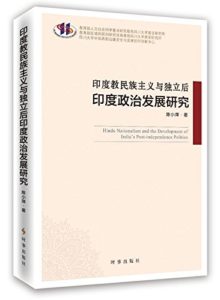
Chen Xiaoping 陈小萍
Beijing: Current Affairs Press, 时事出版社, 2015.
Reviewed by Tong Yutao (Peking University; HYI South Asian Studies in China Program Visiting Fellow, 2019-20)
Hindu nationalism poses the most profound challenge to the governing principles and intellectual maps of independent India (Varshney 2013). It is impossible to study Indian politics without involving Hindu nationalism. However, China’s South Asia studies community has not paid enough attention to Hindu nationalism and Indian domestic politics, despite the fact that western and Indian academic counterparts have done extensive work in this area. Since the 1990s, only a few Chinese scholars have published papers on the topic, and there were no specific books on Hindu nationalism published in Chinese academic circles. Xiaoping Chen’s book, Hindu Nationalism and the Development of India’s Post-Independence Politics, is a welcome change.
Chen’s book predominantly focuses on Hindu nationalism’s influence on the dynamics of Indian domestic politics and foreign policies, and is also a systematic introduction of the emergence, evolution, and development of Hindu nationalism. The significance of this book is reflected in two aspects. First, Chen studies Hindu nationalism and Indian politics from a multi-level perspective. Besides the discussion of Hindu Nationalism on the national level, her research is keenly relevant to the propaganda and mobilization of Hindu nationalism in Gujarat, the tribal area in Odisha, and Chhattisgarh. Such a regional perspective is crucial because there are many significant shifts in Indian politics along with regionalization of politics which underlie the rise of regional parties, identity politics, social movements, and electoral politics at the regional level (Sudha Pai 2013). Second, the book also offers an interdisciplinary perspective. It not only discusses the influence of Hindu nationalism on India’s foreign policy, economic development, and national education but also touches upon the issues of Hindu nationalists’ view of gender and the role of women in Hindu nationalistic movements.
Yet, Chen’s text has several weaknesses. Although she has precisely pointed out that “Hindu nationalism is not Indian nationalism, Hindu nationalism cannot represent the of whole India,” (Chen 2015) she has not made a clear distinction between different kinds of nationalism when she discusses the influence of Hindu nationalism. Most important of all, Hindu nationalism that combines both religion and territory is different from the secular nationalism that combines territory and culture. Secular nationalism insists on pluralism and syncretism; Hindu nationalism insists on assimilation (Varshney 2002). It is difficult to distinguish which kind of nationalism motivated the Indian government to pursue a nuclear power status in the international community. Besides, it is difficult to establish a clear causal relationship between the Hindu nationalistic ideology and The Bharatiya Janata Party’s (BJP) specific policy. Chen admits that the economic policy of Vajpayee’s government has no actual divergence with the policy of Congress when she discusses the economic policy of Hindu nationalism. The problem is that a BJP specific policy could be moderately influenced by Hindu nationalistic ideology, but it does not mean that the policy is a Hindu nationalistic policy, especially when the policy does not target specific non-Hindu groups.
However, the book has real strength. The study of Hindu nationalism is very significant in the current situation. With the BJP winning two landslide victories in general elections of 2014 and 2019, Hindu Nationalism seems to have gained wider support in Indian politics. Some of the BJP’s policies are considered as Hindu Nationalistic. Hindu nationalism will incessantly make inroads on Indian society and politics.
Chen, Xiaoping. 2015. Hindu Nationalism and the Development of India’s Post-Independence Politics《印度教民族主义与独立后印度政治发展研究》 (Current Affairs Press: Beijing).pp.15-16.
Sudha Pai, ed. 2013. Handbook of Politics in India States: Regions, Parties, and Economic Reforms (Oxford University Press: New Delhi).p.2.
Varshney, Ashutosh. 2002. Ethnic Conflict and Civic Life: Hindus and Musilims in India (Yale University Press: New Haven).p.62.
———. 2013. Battles Half Won: India’s Improbable Democracy (Penguin Books: New Delhi).p.100.
